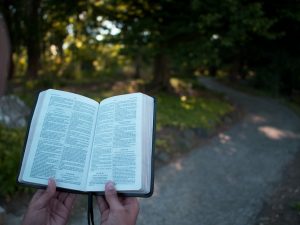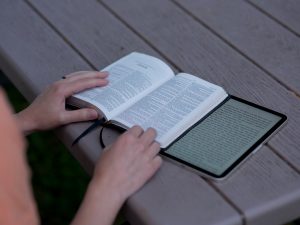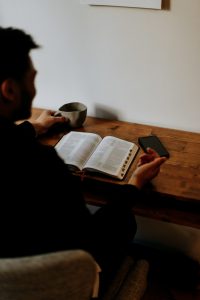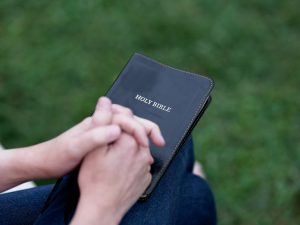There’s a whole season in the American calendar that’s dedicated to fear. Around Halloween, we dress up in costumes and some of them are quite scary. We decorate our front lawns to look like spooky castles. In theaters, on television, and on our streaming services, there’s plenty of fare for the horror aficionado.
 Why do we want to scare ourselves so much? There’s a line of reasoning that says that we simulate fear in controlled environments because fear feels exciting when it activates our fight-or-flight response. Our routinized behavior can feel boring, so being scared makes us feel more alert and aware. Valencia Christian Counseling helps individuals understand and manage fear and anxiety in a healthy, faith-based way, offering guidance rooted in biblical wisdom.
Why do we want to scare ourselves so much? There’s a line of reasoning that says that we simulate fear in controlled environments because fear feels exciting when it activates our fight-or-flight response. Our routinized behavior can feel boring, so being scared makes us feel more alert and aware. Valencia Christian Counseling helps individuals understand and manage fear and anxiety in a healthy, faith-based way, offering guidance rooted in biblical wisdom.
When we’re scared, we focus on the here and now, and we aren’t preoccupied with what needs to happen tomorrow or with what happened yesterday. When we know we’re safe, those feelings of fear can be interpreted as a positive experience. Making it through scary but safe activities can help you feel like you can take on whatever the world throws at you.
When it comes to getting scared in simulated environments, we can find pleasure in those experiences. However, while this kind of scary-but-fun fear has that component of fun, our other fears aren’t so pleasurable.
Why do we fear?
Why is it that we feel fear, and why isn’t that regular type of fear fun in any kind of way? The difference between the scary-but-fun type of fear and our everyday fears is that the latter doesn’t have a safety net beneath it. It’s all tight rope, and a sheer drop beneath.
What is unknown and is out of our control is often what we find most fearful, and we get scared in our everyday lives precisely because we know that we’re not safe. The scares aren’t contained in the frame of the movie or the walk through the haunted maze, but they’re very real. Fear is a response to uncertainty and the possibility that our physical safety is under threat.
The fight or flight response triggered by our fear gets us ready for action so that we can either defend ourselves or escape whatever danger may be pursuing us. It’s a way for our bodies to protect us, and it is a remarkable tool that the Lord embedded in us. Our fear is a way of preserving our lives.
However, our fear can also prevent us from taking scary but necessary steps into the unknown. Being in a relationship with someone might be scary, and taking that next step might be a risk, but it is a risk that can open unimaginable vistas one would never otherwise experience.
What fear and anxiety do to us.
Fear and anxiety are some of the biggest obstacles to our joy, and they rob us of our present. Fear can prevent you from taking a step of faith, and it can make us shy away from the good that God has in store for us.
One key example of this is the ancient Israelites refusing to go into the promised land for fear of the inhabitants. Moses sent twelve spies to see what the land held. Two of those spies returned with a good report that the land was fertile. The other ten gave in to their fear of the fortifications of the cities they would go against as well as the people in those cities.
The ten spies swayed the whole nation. Instead of trusting that the Lord who had just brought them miraculously out of Egypt would defeat these enemies too, the people decided to turn away. This story recounted in Numbers 13-14 is one example of how fear can rob us of the joy and freedom God intends for us.
In the New Testament, Jesus speaks about our fears and anxieties over what we shall eat, what we shall wear, and where we shall live. Our minds are so preoccupied with these things that we forget God’s care for us and the fact that our anxieties and fears add nothing to our lives (Matthew 6:25-34).
Though our futures are not clear to us, we don’t have to deal with uncertainty by being fearful. Instead, we should remember who God is and respond to uncertainty through trust in Him who holds our future in His hands.
Our other fears, whether they are fears of people or situations, similarly rob us of our peace, our joy, and our enjoyment of everyday life. Fear fixates one’s mind on what could happen, All the while one misses what is happening and the good that may occur. Fear and anxiety negatively affect your physical, mental, and emotional health, and they can severely damage your ability to socialize with others too.
What the Bible has to say.
When we read the Bible, we often have the impression that those men and women were somehow less prone to the struggles we face daily. Perhaps it’s the cultural distance or the idea that surely with all those visible signs of God’s presence, there was less reason to fear.
But from what we’ve just seen with what happened in the book of Numbers, even when they could see the presence of the Lord with them, the people were still fearful. Fear can cloud our thinking and make us overlook and ignore what we know to be true.
Some of the many Bible verses that speak to our fear and encourage us to remember in the dark what we knew to be true in the light include the following:
I have told you these things, so that in me you may have peace. In this world you will have trouble. But take heart! I have overcome the world. – John 16:33, NIV
 The disciples heard Him, but they didn’t really listen; their fear got the better of them, and they scattered as soon as He was arrested. At His death, they despaired, forgetting everything He had said about what was going to happen to Him and why.
The disciples heard Him, but they didn’t really listen; their fear got the better of them, and they scattered as soon as He was arrested. At His death, they despaired, forgetting everything He had said about what was going to happen to Him and why.
The disciples heard Him, but they didn’t really listen; their fear got the better of them, and they scattered as soon as He was arrested. At His death, they despaired, forgetting everything He had said about what was going to happen to Him and why.
I sought the Lord, and he answered me; he delivered me from all my fears. – Psalm 34:4, NIV
This Psalm is written by David, who found himself in plenty of tight spots. David was in hiding and running from King Saul, and he had to pretend to be insane when he encountered the ruler of an enemy nation.
One fear from which David would need to be delivered is to be killed outright. After all, David was a powerful warrior who had fought against the Philistines and other enemy nations. David was in Abimelech’s power, and Abimelech could have simply killed him.
Alternatively, Abimelech might have thought to curry favor with King Saul by handing over David, who was a fugitive. King Saul would have likely killed David. Either way, there was much for David to be afraid of in this situation.
But he looked to the Lord, and the Lord gave him comfort and delivered him from his fears. Likely, the Lord helped David to remember who He was and the promises He had made to David. A similar, powerful verse is also from David:
The Lord is my light and my salvation – whom shall I fear? The Lord is the stronghold of my life – of whom shall I be afraid? – Psalm 27:1, NIV
When anxiety was great within me, your consolation brought me joy. – Psalm 94:18-19, NIV
Here again, the psalmist is confronted by a tough situation. But in remembering God’s love and receiving comfort by taking God’s word to heart, the psalmist found support and joy which supplanted fear and anxiety
He got up, rebuked the wind, and said to the waves, ‘Quiet! Be still!’ Then the wind died down and it was completely calm. He said to his disciples, ‘Why are you so afraid? Do you still have no faith?’ – Mark 4:39-40, NIV
These verses come in the context of a story when the disciples were nearly drowning while Jesus was in the boat with them. Jesus was asleep while the waves were threatening to swamp the boat. In fear, the disciples woke Jesus, asking Him, “Don’t you care if we drown?”
them. Jesus was asleep while the waves were threatening to swamp the boat. In fear, the disciples woke Jesus, asking Him, “Don’t you care if we drown?”
Of course, Jesus cared, but their fear made them feel like He didn’t. It also made them forget who was in the boat with them. Our fear can also make us feel like Jesus doesn’t care about us and what we’re going through, but appearance and reality are two different things.
Jesus asked them, “Do you still have no faith?” Didn’t they trust Him after everything they had seen Him do, and who He had shown Himself to be? Fear made them forget everything they knew to be true.
Do not be anxious about anything, but in every situation, by prayer and petition, with thanksgiving, present your requests to God. And the peace of God, which transcends all understanding, will guard your hearts and your minds in Christ Jesus. – Philippians 4:6-7, NIV
Our anxieties and fears can be triggered by any number of circumstances. The way to deal with these is to recall all that God has done for you in the past. You can recall His promises and deeds in the Scriptures, and bring all of this along with your requests before the Lord in prayer. Prayer laced with thanksgiving helps to replace fear, and you can lean in trust in the peace that God provides.
Dealing with fear and working through your anxieties.
Fears and anxieties can come in many shapes and sizes. There are those that are so impactful on a person’s daily functioning that they can rightly be termed phobias and anxiety disorders. To receive such a diagnosis, you need a physician or mental health professional to assess you. If your fear and anxiety are excessive, getting professional help is the best move you can make.
For people with mild fears and anxiety, a professional can also help, though the treatment plan will differ based on the circumstances. In the more severe cases, a doctor may prescribe medications in addition to some lifestyle changes as well as talk therapy. For milder forms of fear and anxiety, talk therapy and lifestyle changes may be sufficient.
Whatever your situation may be, it is important that you reach out for the help you need to bring your anxiety and fear under control. God does not intend for people to live in fear. The apostle Paul wrote:
…for God gave us a spirit not of fear but of power and love and self-control. – 2 Timothy 1:7, ESV
If fear is a concern in your life, reach out to a Christian counselor at Valencia Christian Counseling who can help you confront and overcome it.
“Bible”, Courtesy of Aaron Burden, Unsplash.com, Unsplash+ License; “Bible”, Courtesy of Aaron Burden, Unsplash.com, Unsplash+ License; “Bible”, Courtesy of Aaron Burden, Unsplash.com, Unsplash+ License; “Morning Devotions”, Courtesy of Priscilla Du Preez, Unsplash.com, CC0 License
-
Kate Motaung: Curator
Kate Motaung is the Senior Writer, Editor, and Content Manager for a multi-state company. She is the author of several books including Letters to Grief, 101 Prayers for Comfort in Difficult Times, and A Place to Land: A Story of Longing and Belonging...
Recent Posts
DISCLAIMER: THIS ARTICLE DOES NOT PROVIDE MEDICAL ADVICE
Articles are intended for informational purposes only and do not constitute medical advice; the content is not intended to be a substitute for professional medical advice, diagnosis, or treatment. All opinions expressed by authors and quoted sources are their own and do not necessarily reflect the opinions of the editors, publishers or editorial boards of Stone Oak Christian Counseling. This website does not recommend or endorse any specific tests, physicians, products, procedures, opinions, or other information that may be mentioned on the Site. Reliance on any information provided by this website is solely at your own risk.






